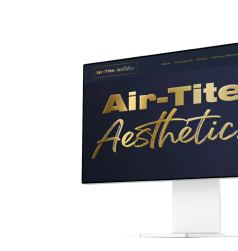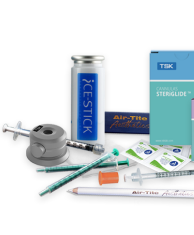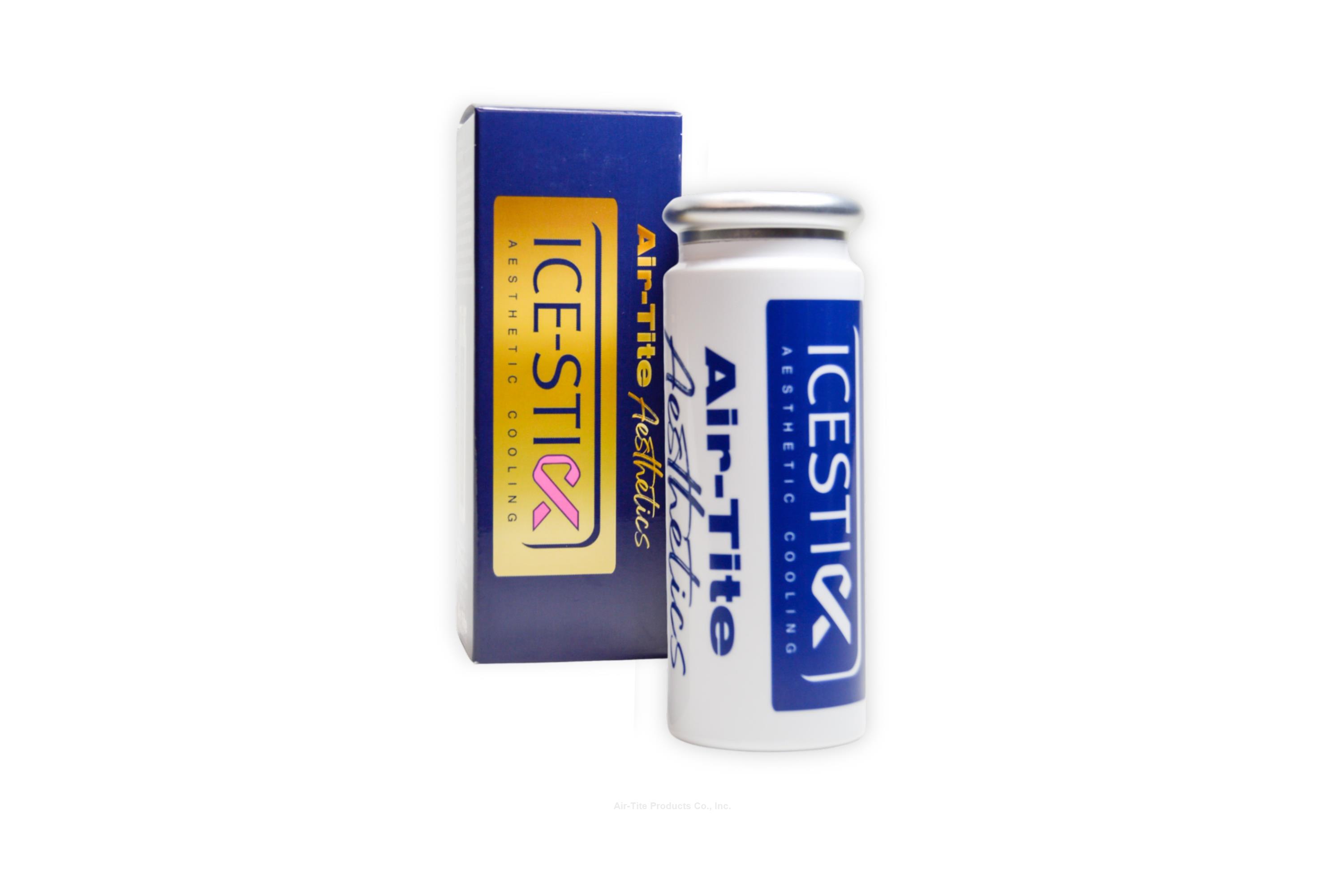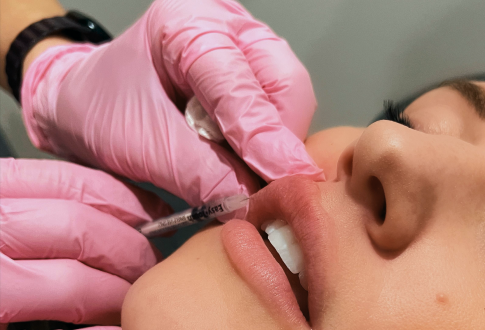When patients trust you to deliver precise, predictable results, you need professional-grade tools that perform every time. Our selection of specialty aesthetics needles, cannulas, syringes, and other supplies gives you everything you need to administer treatment formulations accurately, effectively, and affordably.
Whether you’re a small business or a full-service medical aesthetics practice, Air-Tite has the specialty needles, syringes, and day-to-day supplies you need to provide expert care with confidence while keeping costs under control.
A fresh, user-friendly website with a wealth of comprehensive information on our top-rated aesthetics products.

Ensure you have all of the essential tools for opening your new MedSpa or Aesthetics Practice.




Air-Tite Aesthetics has become a staple in offices around the country due to the high quality products at reasonable prices. TSK Low Dead Space Needles and STERiGLIDE™ cannulas, 0.5 Low Dead Space Luer Lock Syringes, Fixed-Needle Insulin Syringes, and other hard to find aesthetic accessories are popular among aesthetics customers.

 ICE-STICK Aesthetic Cooling Device
ICE-STICK Aesthetic Cooling Device
Ensure perfect placement of aesthetic toxins, dermal fillers, and topicals with maximum patient comfort every time. Choose durable hypodermics that stay sharp during multi-injection treatments. Pick dependable luer lock syringes and thin-walled needles for low-viscosity fillers.
Whatever your aesthetics application, Air-Tite is the leading source of quality brand-name needles, syringes, and other injectables equipment, all at affordable prices.
Air-Tite products are available directly from our warehouses or through popular medical suppliers including Cardinal, Delasco, Henry Schein, McKesson, and Medline.

“Dead space” refers to the small area behind the tip of a syringe where conventional syringe plungers cannot reach. Product in this area cannot be injected during treatment and is often discarded. Air-Tite offers TSK Laboratory low dead space syringes and other products designed to reduce wastage of injectables.
Both luer lock and luer slip syringes accept standard hypodermic needles, but luer slip syringes secure these with a tight “friction” fit between the needle base and the syringe tip. Luer lock syringes instead use threads to secure the needle. Luer lock syringes are more provide an extra layer of security to reduce the risk of needle pop off.
Give us a call. Our helpful, knowledgeable customer service staff are ready to help you find the products, sizes, and combinations you need. And, unlike many aesthetic suppliers, Air-Tite can provide samples of our products for you to try.
Syringes are commonly used medical and industrial instruments but are often relegated to a “one-size-fits-all” designation. However, there are many different syringes on the market, each designed for a specific purpose.
2-part and 3-part disposable syringes are two of the more common syringes, both having qualities that make them ideal for a wide range of applications. Read on to learn more about 2-part vs. 3-part syringes and when each would be the right one for a particular application.
What Is a 3-Part Syringe?
Before we get into the critical differences between these two types of syringes, we need to talk about the most widely used disposable syringe on the market—the 3-part syringe. When someone requests a disposable syringe, they’re often asking for a 3-part syringe.
3-part syringes are extremely popular due to their low cost, smooth gliding motion, and multiple functionalities. The construction consists of a rubber gasket that sits on the tip of the plunger located inside the barrel.
As the plunger is drawn downwards or upwards, the rubber gasket acts as a sealant and creates a vacuum. One small caveat about this is that rubber tends to be a bit sticky when rubbed against a solid surface, such as the plastic barrel of a syringe. Because of this, a 3-part syringe uses a lubricant, like silicon oil, to prevent sticking and allow for a smooth downward and upward motion. For many applications, the lubricant oil does not interfere with the desired results, and the syringes work as intended.
However, for some medical, laboratory, and production applications, the lubricant may act as a contaminant and produce problematic results.
This is where a 2-part syringe comes in handy.
What Is a 2-Part Syringe?
Commonly known by the brand name Norm-Ject® syringe, a 2-part or "all plastic" syringe does not utilize a rubber tip on the plunger to create the vacuum seal. Instead, it uses a precisely engineered and slightly oversized plunger head that expands the barrel and creates a vacuum as it’s drawn downwards.
2-part syringes are made from a polypropylene barrel and a polyethylene plunger and do not require a lubricant. They’re ideal for applications that cannot have the risk of foreign substances (such as silicon oil) potentially interfering with the desired results.
Types of 2-Part and 3-Part Syringes
There are many different types of 2 and 3-part syringes on the market:
These options generally all come in sterile and unsterile as well as by the box, case, in bulk, and mini-bulk.
Syringe manufacturers can also provide customized solutions for higher volume applications, such as:
Frequently Asked Syringe Questions
Now that you know the difference between the types of syringes, we’ll share some of the common questions we hear about these syringes and answer them for you.
What Are Syringes Made Out Of?
Syringes come in a wide variety of materials, each with its own benefits and applications.
Examples include:
Metals like zinc are used in the curing process for the synthetic rubber tip used in 3-part plungers.
Can Syringe Selection Affect the End Product or Results?
Yes! If you’re a researcher or engineer and are having difficulties identifying the source of contaminants in your application, the lubricant that’s used in your 3-part syringe might be at fault.
Products such as the 2-Part Luer Lock syringe from Air-Tite are manufactured from laboratory-grade polypropylene/polyethylene and do not contain styrene, DEHP, silicon oil, or rubber. They are latex-free and are ideal for applications that require a non-reactive, inert syringe.
What Is the Difference Between Luer Lock and Luer Slip?
The key difference between Luer Lock and Luer Slip is that the Luer Lock mechanism allows for twisting a needle onto the tip, which then becomes locked in place. On the other hand, Luer Slip syringes allow for manual pushing of the needle into the tip.
Click here to learn more about Luer Lock vs. Luer Slip syringes.
What’s the Difference Between Eccentric and Centric Syringes?
You might hear the terms Eccentric and Centric (or Concentric) used when referring to a syringe. The main difference is that an Eccentric syringe tip design is offset from the center and resides more toward the edge, whereas a Centric syringe tip is located in the center.
Centric and Eccentric refer to the location of the tip in relation to the body of the syringe. A Centric syringe has the tip located centrally. An Eccentric syringe tip is offset towards the edge of the body part of the syringe.
What Size of Syringes Are Currently Available?
Air-Tite carries many different sizes of 2-part and 3-part syringes from various manufacturers, including:
Where Can I Learn More About 2-Part vs. 3-Part Syringes?
Air-Tite’s very own Will Foley breaks it down even further in a 2-part and 3-part syringe comparison article for Delivery Business News.
2-Part and 3-Part Syringes from Air-Tite
Air-Tite offers a wide range of syringes for medical and laboratory settings. Our team is easily accessible with expert staff that’s ready to discuss any of your syringe-related questions no matter your application.
Not only is our team within reach but so are our products. Air-Tite offers the convenience of purchasing syringes online with reliable and efficient customer service right at your fingertips.
Click below to get started and explore our selection of syringes.
There are currently a few different techniques used to apply PRP, exosomes, serums, ointments, and creams after skin procedures. The most common method is by dripping expensive products directly onto the skin with an open-ended syringe, which is extremely uncontrolled and wasteful. This approach also opens the risk for splatter into a patient’s eye. Another inefficient current technique is to attach a needle to the syringe as an attempt to control the placement and flow of the product, but this is extremely dangerous. If the patient moves suddenly or the syringe is dropped, the chance of a needle stick injury to the patient or provider is very likely. The CuraCator™ provides the solution to needle-free and controlled application of these expensive products to skin.